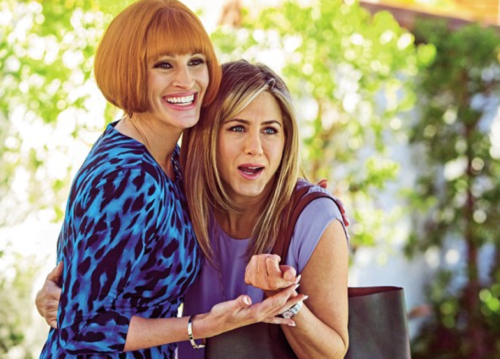In an unfortunate testament to the idea that the older you get as an artist, the more out of touch your work becomes, Garry Marshall ended up concluding his career with Mother’s Day in 2016 (the film was released in April, Marshall died in July). Yet, in a bizarre turn of events, Mother’s Day would prove oddly salient in predicting how Donald Trump could win the election in November.
With regard to some of the cast that inexplicably found themselves participating in this movie, there is Julia Roberts (who has somewhat purged this from her record of late with Homecoming). Perhaps simply wanting to do a favor, to pay her respect to the man that had launched her into peak “America’s sweetheart” territory with, strangely, Pretty Woman, Roberts agreed to play a part in Marshall’s worst movie (or at least the worst of the “holiday” trilogy he put out into the world also consisting of Valentine’s Day and New Year’s Eve).
At first, her appearances are minimal, almost cameo-like in the role of a home shopping network host named Miranda Collins (with a wig befitting that sort of high-powered bitch name, mushroom shape and all–and one that we’re all fairly certain she also wore for a movie even faker than Mother’s Day for one of Anna’s roles in Notting Hill). But slowly, amid the controversy of Jesse (Kate Hudson) and Gabi’s (Sarah Chalke)–in no way connected to Miranda (but then, that’s how these “holiday” movies work)–surprise visit from their ultra conservative Texan parents (it would be funny to hear them chastise Jesse for marrying a “towel head,” except it’s not) in time for Mother’s Day, the focus vacillates between interior designer Sandy Newhouse (Jennifer Aniston) and Miranda.
Sandy, who is actually close friends with Jesse, thereby creating a six degrees of separation sort of effect once she starts working for Miranda on her set, is quick to inform her that her ex-husband, Henry (Timothy Olyphant), is acting strangely toward her and claims he has something important to tell her. Jesse insists it means he wants to get back together, but, of course, what it really means is that he’s married someone much younger in the way of Tina (Shay Mitchell). Feeling foolish for momentarily believing her aging aesthetic could have reeled Henry back in, Sandy’s jealousy immediately rears its green head in manifold ways. In fact, the only person that makes Mother’s Day even remotely watchable (which is a very generous term for this movie) is Aniston, given all the comedic timing and lines, where Marshall’s usual golden girl, Roberts, is left with little more than the product promotion of mood pendants.
Then there is the related storyline of Kristin (Britt Robertson) and Zack (Jack Whitehall), unmarried parents of a toddler–the unmarried aspect of their relationship being something Zack has tried to remedy time and time again, only to receive Kristin’s unexplained rejection. Jesse and Gabi’s unfolding narrative often takes precedence over this in a strange highlight and foreshadowing of how racism–specifically how accepted and laughed off it is–in America would lead to Trump’s election only later that year (despite everyone’s naive certainty that such a thing could never happen). Clichely named Earl (Robert Pine) and Flo (Margo Martindale), the two are no holds barred in their disgust with Jesse marrying an Indian man–a doctor, mind you–and having his child, or Gabi marrying a woman and conceiving through a sperm donor. Granted, both of these things do seem somewhat progressive for Atlanta, where the film takes place. And where, one would imagine, many a “like-minded” person with the ideals and sentiments of Earl and Flo revel in the red stateness of Georgia outside of Atlanta.
And maybe if every Trump supporter had a non-Aryan in their family, they, too, could become a bit more open-minded. As Flo tries to, reconciling that she’s stuck with a brown grandchild, so she might as well make the most of it by noting, “You look kind of like I do..in the summer.” This yuk yuk yuk “humor” is, of course, one of those things where you must consider the source: apparently a team of three screenwriters doing the bidding of a simultaneously in touch and out of touch octogenarian–no, not Donald Trump (still, alas, a septuagenarian), but Garry Marshall. While it was universally panned by critics, it didn’t mean Mother’s Day didn’t have its fair share of viewers during the first weekend it opened, helping them all to gauge just where we were at (and continue to be) on the spectrum of accepted racial biases.
But if you must choose between watching this and the other Mother’s Day, always go for the true grit of the latter, offering the kind of violence that Trump supporters love even more than bigotry. Come to think of it, a double feature of both Mother’s Days probably ought to become a staple in the South.




















